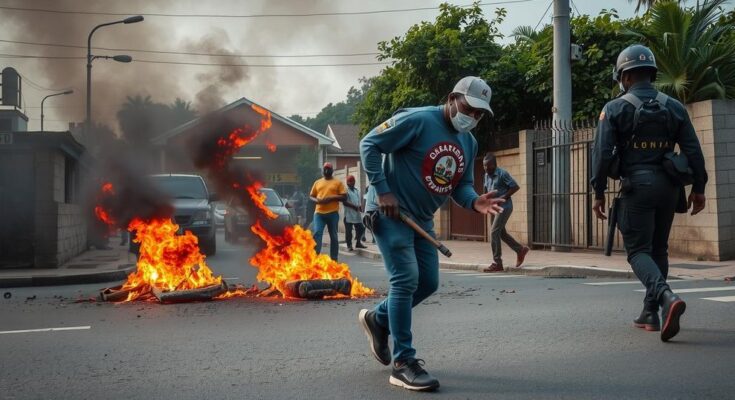Mozambique faces severe civil unrest following disputed election results, leading to violent protests, looting, and significant disruptions in major cities. The ruling Frelimo party’s retention of power has triggered widespread discontent, resulting in fatalities and calls for continued opposition demonstrations, which have been met with police violence. International organizations, including the UN, urge dialogue to resolve the escalating crisis.
Major cities throughout Mozambique faced significant disruptions on Friday due to escalating post-election violence following the controversial election results confirmed by the Constitutional Council. The capital, Maputo, and its largest suburb, Matola, experienced business closures and halted transportation, while protests led by opposition factions resulted in widespread looting, property damage, and confrontations with police. After the ruling Frelimo party retained power, discontent among the populace surged, leading to violent demonstrations that have already resulted in numerous fatalities. The unrest has underscored a growing discontent against the Frelimo party, which has been in power since 1975, with opposition leaders calling for continued protests against the disqualification of electoral processes. The situation has prompted international concerns, with calls for dialogue to resolve the unrest and restore peace in the region.
The unrest in Mozambique stems from the recent presidential election, where the ruling Frelimo party claimed victory amidst allegations of electoral fraud and mismanagement. The resultant anger from opposition groups manifested in protests that quickly turned violent, highlighting long-standing grievances against Frelimo’s extended rule. Since taking power in 1975, Frelimo has maintained its political dominance, yet increasing dissatisfaction among citizens is forcing them toward direct action. Government responses to the unrest have raised questions about state authority and civil rights, exacerbating tensions in an already volatile context. Reports of deteriorating public safety and economic stability due to violent clashes call for immediate attention from both national leaders and international bodies.
In conclusion, the unrest in Mozambique is a glaring reflection of the deep political divisions and public dissatisfaction with the current regime. The violence that ensued following the election outcomes signals a critical juncture for Mozambique, necessitating urgent dialogue among political leaders to restore stability and prevent further loss of life. With international concern mounting, there is a pressing need to address the grievances of the populace while ensuring security and the protection of civil rights. The path forward requires collaboration and a commitment to democratic principles, which are essential for peace and progress.
Original Source: www.dw.com




